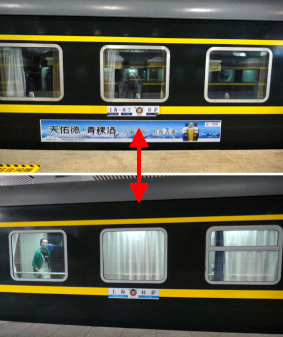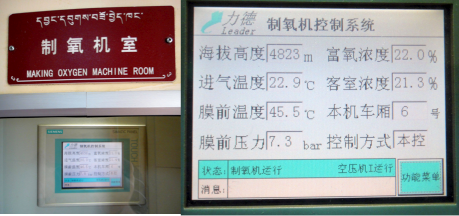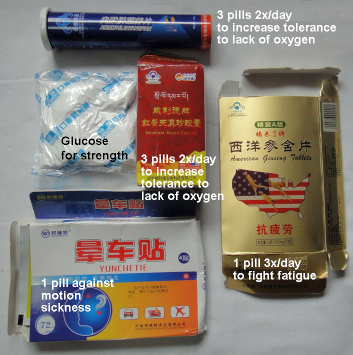Personal, somewhat random notes on a
one-week train trip from
Shanghai to Lhasa (Tibet)
and back
(June-July 2017)
|


|
-
(Likely) the longest train trip of your life
The full trip from Shanghai to Lhasa (Tibet) is 48 hours long.
Prepare for a tough security screening similar to international
airports: no pocket knives or hair spray. Tibet permits are checked
before boarding the train (typically in the evening). Make several
copies of your Tibet permit. Security personnel, train staff and
police are plentiful, professional, and helpful. Wheelchairs are
available inside terminal train stations for those in need. Board
the train up to 30 minutes prior to departure.
-
Different classes of seats
Invest in "soft sleepers" if you can: only four persons per
(closed) compartment. If you can, select the "lower seat/bed":
they are recognized by an odd seat number in your assigned wagon.
Tickets are sold 28 days prior to the trip, not earlier. Travel
agencies may have priority access to tickets. Demand significantly
exceeds supply.
-
Services on the train
Hot water and thermos flasks are available free of charge
throughout the trip. So are hotel-style one-way slippers. You may
bring your own food. If you like tea and not just hot water, bring tea
bags along. In any case, bring a roll of toilet paper! A restaurant
car serves breakfast, lunch and dinner at times proper for these meals.
About 5-8 variations of sets are offered. Menu is only in Chinese,
but you can look around and point to others' plates what you may like.
Lunch and dinner: pork, beef or fish with rice. Typical price is
50-80 RMB per meal per person. There are "eastern" and "western" toilets
in every wagon, as well as washing basins. Some may become dysfunctional
during the long trip due to altitude sickness of passengers
(see later; both toilets and washing basins may become plugged).
220 V electricity plugs are in compartments and the hallways.
No Wi-Fi on the train. The stops are short and, maybe with 1-2
exceptions, nobody is allowed to leave the train.
-
The first day on the train
The first day covers the low plateau up to Lanzhou: agriculture,
industry, no big surprises.
-
Un-advertised train change in Xining
Few trains starting East contain the oxygen enrichment equipment
required to enter Tibet. If yours is not, expect to
change to an identical train
and identical seat at Xining, about 24 hours from
the departing terminal station (train waits across the platform).
Travellers are allowed almost 30 minutes to change the train in
Xining.

-
Rapid rise in altitude at the end of day one
The train starts climbing fast west of Golmud Station, 830 km from
Xining. The highest point at 5072 m is Tanggula Pass, just before
reaching the Buqiangge Station. For most travellers this is deep
in the night. Air pressure drops significantly and most will become
uncomfortable while asleep. I am not joking: you will get sick
like everyone else. If the sky is clear, the stars are incredible
due to the high altitude and low light pollution.
-
Beware of low air pressure!
The train is not pressurized: air pressure corresponds to
the environment outside. A
screen near the oxygen enrichment aggregate
indicates the local altitude. The oxygen enrichment aggregate increases
the percentage of oxygen on the train artificially from 22% to 25%, but three
percent is not much. There are "private oxygen outlets" near the beds: insert your
finger into the outlet and press to increase oxygen supply. You may also
ask the train personnel for a breathing tube.
Be prepared for a day at an altitude of about 4000-4500 m. In spite of
medications alleviating the symptoms
(providing better tolerance to low-oxygen environment), most travellers
feel sick, with symptoms varying from sever headache to stomach discomfort
and much worse. Read about the high-altitude sickness elsewhere on the web.
Most toilets and washing basins may become unusable as a consequence of
passenger discomfort.


-
The second day on the train
The second day is on a high plateau at about 4000-4500 m. One
surprise: unlike Europe, no snow anywhere to be seen during
mid-summer. Very little snow even on most of the surrounding
mountains! The second day on the train ends in the Lhasa terminal
station. The lower altitude of Lhasa at 3500 m makes breathing
easier. After transfer to the hotel, go to bed early. Avoid alcohol.
Also in Lhasa, there is no snow on the surrounding mountains in summer.
Remember that mid-summer is rainy season. Still, weather changes fast
and you will see the sun among clouds.
-
Local population and customs
You will find the local population of Tibet extremely friendly, in
spite of the language barrier. In the Buddhist religion, the other
person comes first. Big smile, big help. Learning the expressions
for "Hello" and "Thank you" in the local language of Tibet goes a
long way, beyond what you would expect elsewhere. While body contact
is not common in the Orient including Tibet, I got quite a few pats
on the shoulder after many laughs with local people. Do not point
with a finger. A hand-wave is a universal gesture of politeness.
Watch the peaceful expression in the faces of old local people;
it witnesses a joyful heart. Don't be shy to use gestures to show
local people that you like and appreciate them.
-
Benefits and power of Tour Agencies in Tibet
All foreigners must be accompanied by a Tour Agency representative
at all times. He/she governs your life during the day. No
deviations from a pre-set schedule. Arranging for a Tour Agency
ahead of time is the pre-requisite for getting a Tibet permit
ticket allowing entering Tibet.
-
Must-sees in Lhasa
The must-sees in Lhasa are the Potala Palace, the
Jokhang Temple and the adjacent Barkhor Street.
All of these are incredible and unique, well worth their place on
the U.N. World Heritage list.
Bring a small backpack with
- Sun glasses
- Hat to cover your head (you can buy it on Barkhor Street)
- Folding umbrella
- UV protection cream
- Sweater or equivalent
- Bottle of water (you can buy bottled water everywhere)
- Toilet paper/tissue
-
Potala Palace
Foreigners must get tickets to the Potala Palace ahead of time.
Passport, Chinese entry visa and Tibet permits are checked several
times, including x-ray/metal detectors. Everyone is
assigned 1 hour (entry time precise to the minute) to visit the
Potala Palace. One ticket per person per week. Be ready to climb
about 300 m from the ground level to the top (climbing time of the
initial 175 m is not included in the 1-hour limit). Inside the
palace, many staircases are steep and narrow. Your Lhasa visiting
schedule is dictated by the time assigned to visit Potala Palace.
The entire visit takes about 3 hours. There is no place to
deposit your backpack prior to entering the palace. You can take
everything in your backpack except water (like on the airplane;
you can buy water inside the palace.) There are limited toilet
facilities in the palace.
-
Jokhang Temple and Barkhor Street
Visiting the the Jokhang Temple, a World center of (Tibetan)
Buddhism and the adjacent Barkhor Street (combination of
pilgrimage circle and tourist shops) takes about 3 hours. All
visitors enter through regular x-ray/metal detector security and
are well protected by riot police. Visit is well worth it, also in
comparison to the Potala Palace. You can see Potala Palace from
the third (top) floor of the Jokhang Temple. Have simple lunch on
Barkhor Street.
-
Selection of tour guides
If your trip is arranged by a travel agency, insist on a
Tibetan-born guide if possible. This gives you better insight into
the Buddhist religion (followed by maybe 85% of the population)
and the indigenous culture. Most guides, it seems, are volunteers
from mainland China. Ours memorized all information quite well,
but knew little beyond the books she learned from.
-
Importance of following set rules
People are created to follow rules here, not the other way round. Those
familiar with travel in former Communist countries in the "good
old times" will have old memories resurface. Assigned tour guides
are programmed to accommodate the average 20-50 year old tourist.
Those deemed unfit are sent back to the hotel. Travel agency
minivans may stop only at a limited number of places and park only
in selected parking spots. No exceptions, not even for otherwise
healthy, handicapped people. Instead of a 20-minute walk, you may
insist on taking a taxi instead; taxis are flexible and apparently
less afraid of plentiful traffic cameras and tickets. But resisting
your assigned guide could get him/her fired. Do not dare to take
photos where not allowed. Beware of any soldiers or military
installations being part of your photo. I believe railway stations
and airports are defined as military installations as well.
-
Elderly/handicapped
If you are older than the "standard" tourist and slower in walking,
do not give up. A folding walker is a good idea for the less mobile.
Make sure your body will perform at a high altitude. The tour guide will
accommodate your slower walking. The tour guide may not leave you
behind a group in a tea-house; he/she is responsible for anything
that could happen to you there and get fired. Either follow
(slowly) or return to the hotel in the Tour Agency minivan.
-
Departure routine
When departing by train, follow where most people
go, on the right-hand side of the huge plaza facing the station.
Be prepared for a security check surpassing that at most
international airports. Be prepared to leave things behind that may
be allowed on a plane. Pre-departure health check includes testing
your body's oxygen level (electronic gadget at the tip of your
finger). Board the train up to 30 minutes prior to departure. Allow
for 60-90 minutes to queue up for security screening and multiple
ticket/passport check-points that may become crowded.
-
Getting back
Unlike on the way to Tibet, most passengers know what to expect.
Most got acclimatized to the high altitude during their stay in
Lhasa. Toilets and washing basins remained clean. Still, the
train staff sanitized the toilets close to midnight. The way back
remained uneventful.
|




